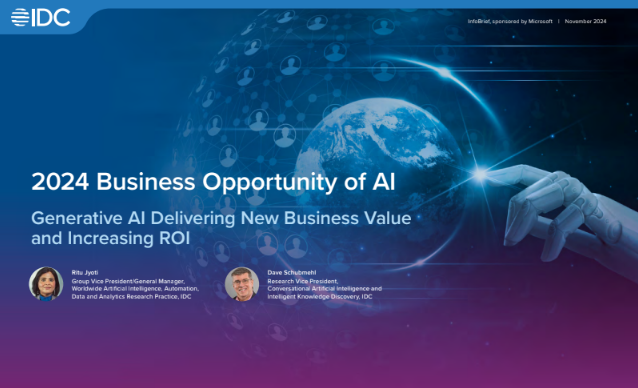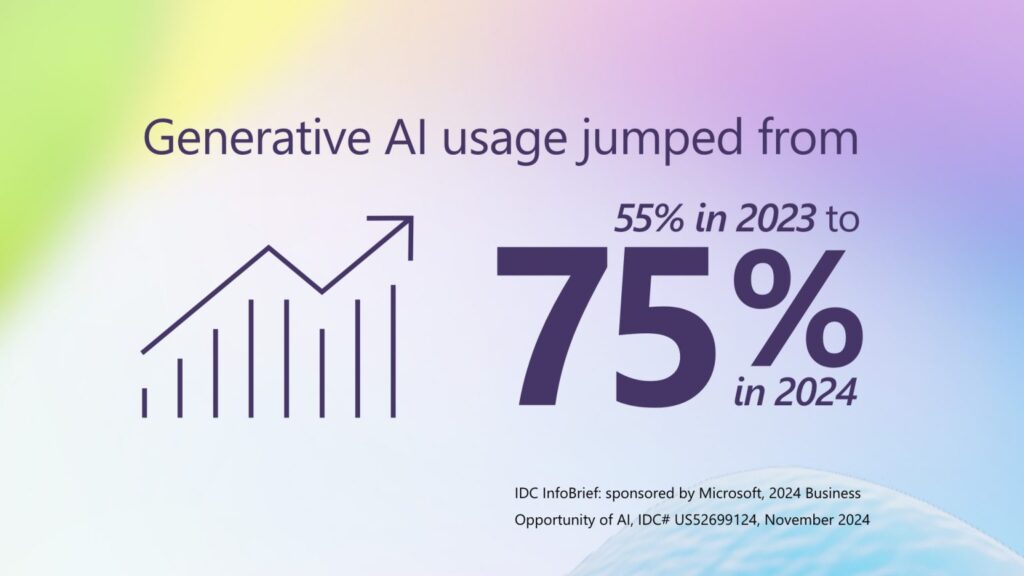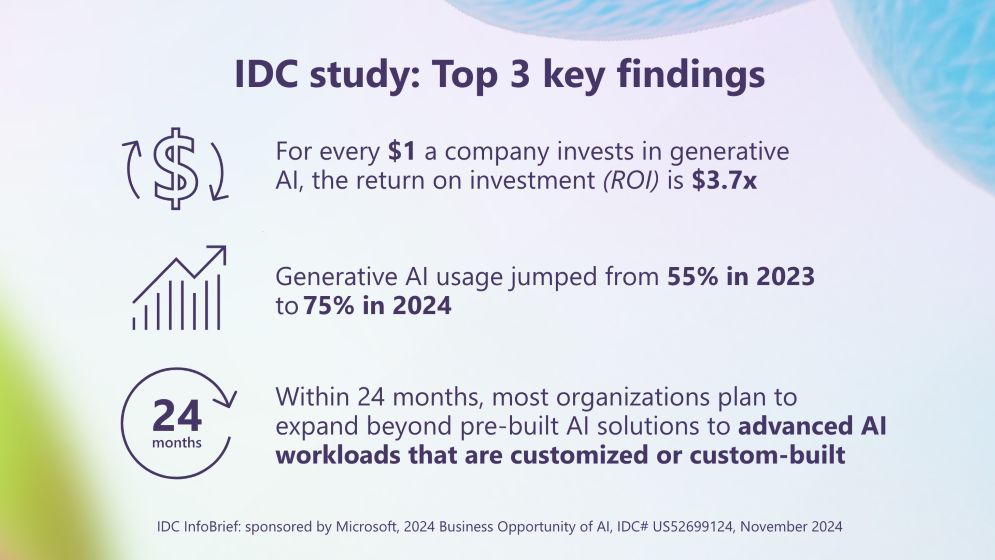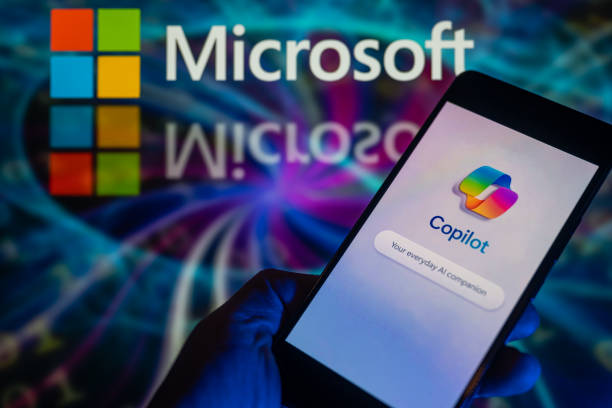Generative AI is revolutionizing industries across the globe, and businesses in the Philippines are no exception.

According to the newly released IDC x Microsoft 2024 Business Opportunity of AI report, Filipino companies are accelerating their adoption of generative AI technologies, unlocking new growth opportunities, improving efficiency, and enhancing their competitive edge.
With key sectors such as finance, retail, and telecommunications leading the way, Philippine businesses are harnessing AI to streamline operations and drive innovation.
Generative AI: Empowering efficiency and strategic focus
One of the key findings of the report is the rapid pace at which generative AI is being integrated into business operations.
Globally, 75% of businesses are now using generative AI, up from just 55% in 2023.

In the Philippines, this shift is significantly enhancing workplace efficiency. Peter Maquera, CEO of Microsoft Philippines, explains that AI is enabling businesses to automate routine tasks, freeing employees to focus on higher-value, strategic initiatives.
“Generative AI is changing the way Filipino businesses approach their work,” Maquera said. “By automating repetitive tasks and enhancing decision-making, employees can concentrate on activities that directly impact business growth and customer satisfaction.”
One notable example is Visa’s use of Microsoft’s Copilot AI tool, which streamlines financial processes, allowing Visa employees to focus more on strategic projects and customer value, rather than time-consuming data entry. This shift has not only improved productivity but also positioned companies to deliver enhanced services.
Delivering strong ROI and quick wins
The report highlights the strong return on investment (ROI) from AI adoption.

Globally, businesses see an average return of US$3.70 for every dollar spent on AI. In the Philippines, finance and media sectors are seeing even greater returns — up to US$10 per dollar invested.
Maquera points out the remarkable speed at which these returns are realized.
“Filipino companies deploying AI tools often see measurable results within 13 months, which puts them in a strong position for sustainable growth in today’s highly competitive market,” he said.
For example, BP is using Copilot to optimize production processes, leveraging AI to predict maintenance needs and boost operational efficiency. This proactive approach has significantly improved productivity while reducing downtime, showcasing the potential of AI to enhance operational performance across industries.
Tailoring AI solutions to local needs
As AI technology matures, businesses are increasingly seeking custom solutions that address their specific needs.
Globally, 24% of organizations have moved beyond pre-built AI tools, and this trend is also gaining momentum in the Philippines. Local companies are now looking for AI applications that can enhance customer experiences, streamline logistics, and optimize operations.
“AI’s flexibility is driving demand for tailored solutions, as companies in the Philippines pursue custom tools designed to meet their unique goals — from improving customer interactions to boosting efficiency,” Maquera further noted.
This trend is especially significant in industries such as healthcare, where companies are seeking AI-powered solutions to improve patient care, and in retail, where AI is being used to optimize inventory management and customer service.
Revolutionizing key sectors: Finance and beyond

Industries like healthcare, finance, and manufacturing are witnessing transformative changes due to AI. In healthcare, for example, Pfizer has leveraged Copilot to accelerate drug discovery by analyzing large datasets more efficiently.
This approach could have similar applications in the Philippine healthcare sector, improving patient outcomes and operational efficiency.
In the finance sector, AI tools are enabling faster, more accurate data analysis, helping businesses make data-driven decisions and respond to market changes in real-time. Retailers are also benefiting from AI-powered chatbots and virtual assistants that enhance customer service and streamline operations.
“AI is helping industries vital to the Philippine economy, like manufacturing and finance, not only save costs but also set new industry standards for quality and efficiency,” said Maquera.
Boosting productivity amid talent gaps
One of the most compelling reasons for the rapid adoption of AI is its ability to enhance productivity. The report reveals that 43% of global businesses attribute their highest returns to gains in productivity.
In the Philippines, companies are using AI to automate tedious tasks, improve workflow efficiency, and increase overall employee performance.
Consulting firm Accenture, for example, has integrated Copilot into its services, enabling clients to make faster, data-driven decisions.
By leveraging AI’s capabilities, Accenture delivers more insightful analysis, giving its clients a competitive edge.
However, Maquera also emphasizes the need for local talent equipped to manage and develop AI solutions. “As AI adoption continues to grow, there is an increasing demand for skilled professionals capable of managing and implementing AI solutions,” he said. Microsoft is committed to supporting initiatives in the Philippines to build this crucial talent pool.
Looking to the future: Industry-specific AI applications
The report projects a continued rise in industry-specific AI applications over the next two years, particularly in sectors like healthcare, education, and manufacturing.
Companies like KPMG and PwC have already integrated Copilot into their audit and tax services, automating data handling and enabling professionals to focus on more complex tasks.
This trend is expected to reshape professional services in the Philippines, particularly in fields that rely on data analysis and process automation.
“AI’s impact is expanding into every corner of the economy, and in the Philippines, industries like healthcare, education, and even manufacturing are exploring ways to leverage AI to address specific challenges — from improving patient care to enhancing product quality and driving innovation in classrooms,” Maquera concluded.
The IDC x Microsoft 2024 Business Opportunity of AI report underscores the transformative power of generative AI in helping companies stay competitive, boost productivity, and drive long-term growth. As AI technology continues to evolve, Filipino businesses are uniquely positioned to leverage its potential, positioning themselves for success in the global marketplace.







